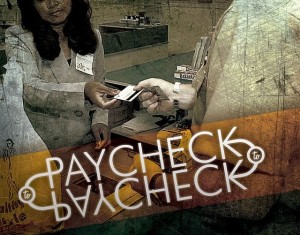 Some of my friends have this attitude that they have the money and they should spend it now while they can afford it. They have the attitude that they are spending because I can afford it approach. We were out with another couple at a restaurant were the spouse ordered several dishes and barely touched any of them. I asked her why she ordered all this food and then did not eat it. Her response was, who cares, we can afford it. When I asked her if she was going to take it home for a later meal, her response was, NO, we do not eat left overs! We decided to add this post because it really illustrates how couples can save some money while still enjoying themselves.
Some of my friends have this attitude that they have the money and they should spend it now while they can afford it. They have the attitude that they are spending because I can afford it approach. We were out with another couple at a restaurant were the spouse ordered several dishes and barely touched any of them. I asked her why she ordered all this food and then did not eat it. Her response was, who cares, we can afford it. When I asked her if she was going to take it home for a later meal, her response was, NO, we do not eat left overs! We decided to add this post because it really illustrates how couples can save some money while still enjoying themselves.
Spending Because I Can Afford It – Surprised
My wife and I were really surprised at this brazen display of waste of both food and money. Our parents raised us to enjoy our food, to eat what was in front of us and not to over eat either. We always ate left overs, even from restaurants and just as important we always are careful with our money. We try to really enjoy ourselves but we avoid wasting it too. In this example, you might as well flush $20 or $30 down the toilet!
Why Should We Care About Saving or being Careful with Our Money?
For this couple that we discussed above, they are well off right now, both have jobs and make a good salary between them. They have more money than they need and their kids are out of the house and doing well on their own. So really, if they want to waste some money, why not?
Well it turns out there are lots of reasons to be careful with their money. These range from loss of their current jobs, sickness in their family, sickness for one of them and causing them not to work, their investments nose dive, their company they work for goes bankrupt and they lose their pension, and any number of other potential conditions that could cause them to have money issues. What would happen if you lost your health insurance?
While we cannot predict any of these situations and we can never save enough money for all situations, some money should be set aside for a rainy day. When you are wasting money it is so easy to save for the future.
Saving Your Money for an Emergency
We do not have any idea if these friends of ours have savings or not and if they have enough to look after them if and when they have some kind of an emergency. Let’s hope that they do.
If they do not and they are spending money in this manner, it is really time to begin saving and make sure they have funds set aside to help them when they are out of work or are dealing with an emergency sickness or some other life style problem.
Everyone should have at least 6 months to 12 months in emergency savings set aside and they should have money set aside for retirement as well. Always diversify your holdings and make sure that you do not invest in some get rich quick scheme. If you need the money at some point, you want to make sure that your investment is not at a low point which causes you to lose money.
Are they Just Showing Off
Could be that they are trying to show off to try to tell us that they can afford to do whatever they want to do. However in this particular case, I think they have no clue about money in general and investing. This is the same couple who asked me if they should keep their money in GIC’s or just in the bank to make sure they had access to it when they needed it.
They worry at night about losing their money they have saved and have gone to GIC’s instead. When we talked about financial issues, the wife does not even participate, leaving it all up to the husband to decide. She just spends money like it is water. Wow what a situation for home to be in. Glad that it is not me!
I really hope they never need to be concerned about their finances. At the same time, by being a little less frivolous, perhaps having a budget and investing wisely, they could have a lot more and do a lot more to.

